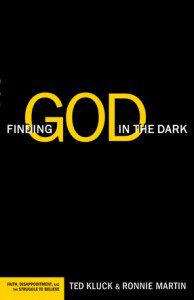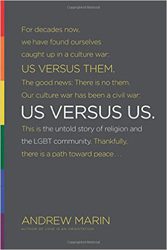 As I read Ted Kluck and Ronnie Martin’s testimonies to God’s sovereignty in Finding God in the Dark (now featured at the Patheos Book Club), I recalled the fact that the New Revised Standard Version gives two alternative translations of Romans 8:28:
As I read Ted Kluck and Ronnie Martin’s testimonies to God’s sovereignty in Finding God in the Dark (now featured at the Patheos Book Club), I recalled the fact that the New Revised Standard Version gives two alternative translations of Romans 8:28:
All things work together for good for those who love God…
In all things God works for good for those who love God…
Our preferred translation reflects and shapes our theological vision and interpretation of the joys and sorrows of life. Kluck and Martin uphold God’s sovereignty above all else and affirm without reservation that “all things work together for good.” In contrast, I believe that God’s providence (a term I prefer to “sovereignty”) is relational and thus affirm that “in all things God works for God.”
Finding God in the Dark begs the question, “What kind of God will we find in the dark?” Calvinists, like Kluck and Martin, assert that, by definition, what God wills is good and to be accepted regardless of its impact on our lives. To doubt that God has everything in control and that everything obeys God’s plan is to fall into sin and impiety. As Kluck and Martin proclaim, “because God is sovereign, it means that every event that unfolds in our lives is under His watchful eye and within His careful design.” (60)
Three affirmations undergird Finding God in the Dark (51):
- God is sovereign
- God is working in all things for my good
- God is good
God, accordingly, “uses all things, including the sinful acts of men, to bring about His will and purpose.” (27) God humbles us by bringing adversity into our lives as a reminder that we are not in charge, that we are dependent on God for all good things, and that our plans are always subservient to God’s will. God drives us to our knees through infertility, inability to adopt a child, and professional failure and economic insecurity to give us a true perspective on life.
After all, any assertion of our creativity or artistry is an affront to God’s will, seen in terms of power and not morality.
A number of years ago, I challenged a similar viewpoint with my text, Holy Adventure: 41 Days of Audacious Living. In that theological-spiritual text, I suggested an alternative vision to Rick Warren’s Purpose Driven Life. I felt that Warren had sacrificed God’s love to God’s power and control. Coercion and control were more important, in my reading of Warren, than empathy and compassion. Warren, similar to Kluck and Martin, asserted that all the important events of our lives are chosen by God without our input; moreover, everything that happens, even tragedy, abuse, and family violence, are father-filtered to achieve God’s plan for our lives. This is all well and good in a world in which sovereignty is the most important value, in which God’s plan is supreme and our pain and doubt is of little account. In such a world, our feelings truly don’t matter except as an expression of God’s plan or in alignment with God’s will. Any initiative on our part robs God of God’s majesty and is worthy of condemnation!
Kluck and Martin are derisive about “partial sovereignty” that opens the door to creaturely initiative and, dare I say, value in relationship with God. What do our feelings and dreams matter when God has “perfect control over all things?” (84) Do the feelings of a Ukrainian infant matter? Do the dashed dreams of hopeful adoptive parents matter? At the end of the day, apparently they do not.
Let’s look at another approach, what Kluck and Martin might derisively call “partial sovereignty” or what I call “gentle providence.” From this approach, not everything reflects God’s will. Freedom and agency are real in the world of cancer cells, failed dreams, administrative misconduct, and business dealings. People can choose against God and God has to live with these choices. God is active in all things but God’s providence works in the context of a dynamic multi-causal matrix of events. God works in all events and treasures all experience, seeking wholeness in the context of events God would never have chosen. This gentle providence can be described by the translation, “in all things God works for good.”
We worship God, from this perspective, as a result of God’s tender care, constant inspiration, all-knowing empathy, and innovative responses to every event of our lives. God is powerful, but is known, first of all, in terms of love. God’s providence is loving providence; God’s power is loving power; God’s sovereignty (if we use this archaic imperial language) is loving sovereignty. A Ukrainian baby matters to God, for God is the fellow sufferer who understands. (Alfred North Whitehead) Parental dreams matter to God, for God is the loving heart of the universe. Our careers matter to God because God aims at abundant life for all of us.
God’s election is not, in contrast to Calvinist thought, partial, but global and universal. God seeks the well-being of all creation. Although creatures are often at cross-purposes due to self-interest and survival issues, God continues to work to bring about a world of Shalom, beauty, and wholeness, and God asks us to be agents of creativity and take our role as companions in God’s providential quest to heal this good Earth. No one is forsaken, even those we might consider beyond the circle of God’s “elect.”
God doesn’t control everything and God grieves over our decisions and the decisions of institutions, bureaucracies, and governments. God feels our pain, from the inside as a companion not the outside as a spectator or cause, and God provides possibilities, inspirations, and energy to do the good work that is our calling in an open-ended, love-supported universe.
Visit the Patheos Book Club for more conversation on Finding God in the Dark.













